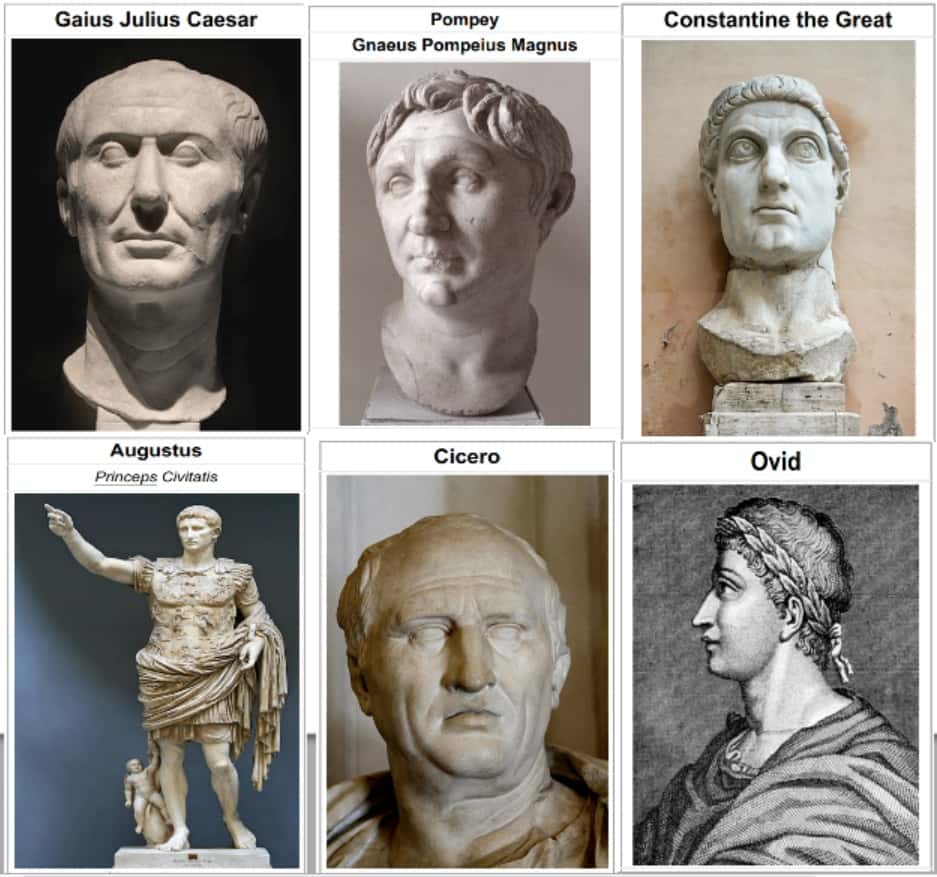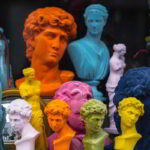Below are the 40 most famous and influential ancient Roman statesmen, generals, scientists, philosophers, and writers. A multiple choice test follows with the answer key at the end.
In 509 BCE, the Roman Republic was established following a successful rebellion against the Etruscans. The Republic was a federal system, which means that power was distributed among the central government and local governments. The Roman Republic was led by two consuls, who were elected by the people for one-year terms and also acted as the leaders of the Roman army. There was also a Senate, composed of wealthy and influential citizens, that served as an advisory body to the consuls. Additionally, the people had a say through the Comitia, an assembly that had the authority to create laws and elect magistrates.
During the Roman Republic, Rome expanded its territory through military conquest, including the Punic Wars against Carthage which resulted in Rome gaining control of much of the western Mediterranean. By the end of the Republic, Rome controlled an empire that included parts of Europe, Africa, and Asia. As the Republic came to a close, political turmoil and struggles for power between different factions and individuals increased. Perhaps the most notable was Julius Caesar, who, after a series of civil wars, became dictator of Rome in 44 BCE. However, he was assassinated the following year, throwing Rome into further chaos.
The Roman Republic officially ended in 27 BCE when Augustus, Caesar’s adopted son, defeated his last rival and was given the title “Augustus” by the Senate. Augustus established the Roman Empire and became its first emperor. He maintained the appearance of a republic by keeping institutions such as the Senate and consuls, but in reality, the Empire was a monarchy.
Under Augustus and the emperors that followed, the Roman Empire continued to expand and flourish through its implementation of laws, public works, and government-funded programs. It reached its height under the Five Good Emperors, during which it experienced a time of peace, prosperity, and stability. The empire during this time was able to maintain peace, prosperity, and relative stability throughout most of its territories through the implementation of a complex system of laws, public works, and government-funded programs. Emperor Trajan was one of the most successful military commanders of Rome, conquering Dacia, Parthia and expanding the empire to its territorial peak.
The Roman Empire began to decline over time due to factors such as overspending on military conquests, economic difficulties, and political corruption. In 410 and 455, barbarian tribes sacked the Empire, and in 476, the last emperor was deposed by a Germanic king, effectively ending the Western Roman Empire. The Eastern Roman Empire, on the other hand, survived as the Byzantine Empire until it was conquered by the Ottoman Turks in 1453. The Roman Republic and Empire were powerful civilizations that left a lasting legacy in the fields of law, engineering, language, and architecture that can still be seen today. More learning materials on can be seen on our page: Ancient Rome Teaching and Learning Resources and at An Illustrated History of the Roman Empire.
40 most Influential Figures from the Roman Republic and Roman Empire
- Antoninus Pius was a Roman emperor who is known for his just and fair rule. He is also known for his building projects and his support of the arts.
- Appian was a historian and lawyer who is best known for his work “Roman History,” a history of the Roman Empire from the end of the Punic Wars to the reign of Emperor Antoninus Pius.
- Apuleius was a writer and philosopher who is best known for his work “The Golden Ass,” a novel that tells the story of a man who is transformed into a donkey.
- Augustine of Hippo was a bishop, theologian, and philosopher who is considered one of the most important figures in the history of Christianity. Augustine was a convert to Christianity and his writings, including “Confessions” and “The City of God,” had a profound impact on the development of Christian thought.
- Augustus was the first Roman emperor and one of the most successful rulers in Roman history. He transformed the Roman Republic into the Roman Empire and established many of the institutions that would shape Roman government for centuries.
- Aulus Gellius was a writer and lawyer who is best known for his work “Attic Nights,” a collection of miscellaneous writings on a variety of subjects.
- Aulus Vitellius was a Roman emperor who is known for his military campaigns and his building projects. He is also known for his lavish lifestyle and his love of luxury.
- Cassius Dio was a historian and statesman who is best known for his work “Roman History,” a history of the Roman Empire from the founding of Rome to the reign of Alexander Severus.
- Cicero was a statesman, lawyer, and philosopher who is considered one of Rome’s greatest orators and writers. He played a key role in the transformation of the Roman Republic into the Roman Empire and was an important figure in the development of Western political thought.
- Claudius was a Roman emperor who is known for his military campaigns, his building projects, and his administrative reforms. He was also a scholar and wrote several works on a variety of subjects, including history and religion.
- Constantine the Great was a Roman emperor who is best known for his conversion to Christianity and his promotion of the religion throughout the Roman Empire. He is also known for his military successes and for his contributions to the construction of the city of Constantinople.
- Eusebius was a historian and bishop who is best known for his work “Ecclesiastical History,” a history of the early Christian Church. He is also known for his support of the Roman Emperor Constantine and his role in the development of Christian doctrine.
- Gaius Julius Hyginus was a writer and scholar who is best known for his work “Fabulae,” a collection of myths and legends.
- Galen was a physician and scientist who made important contributions to the understanding of anatomy, physiology, and pharmacology. His work had a major influence on the development of medicine in the ancient world and beyond.
- Gnaeus Pompeius Magnus, known in English as Pompey the Great, was a statesman and general who played a critical role in the late Roman Republic. He is known for his military victories and his political ambitions, which ultimately led to his downfall.
- Hadrian was a Roman emperor who is known for his military campaigns and his building projects, including the construction of the wall that bears his name in Britain. He was also a patron of the arts and is known for his support of literature and philosophy.
- Horace was a poet and satirist who is best known for his “Odes,” a collection of poems that explore themes of love, friendship, and politics.
- Jerome was a biblical scholar, translator, and theologian who is best known for his translation of the Bible into Latin, known as the “Vulgate.” Jerome was an influential figure in the development of Christian thought and his works are still widely studied and admired today.
- Julius Caesar was a statesman and general who played a critical role in the transformation of the Roman Republic into the Roman Empire. He is one of the most famous figures in Roman history and is known for his military victories, political maneuvering, and assassination.
- Livy was a historian and writer who is best known for his work “Ab urbe condita,” a history of Rome from its founding to the end of the Roman Republic.
- Lucretius was a poet and philosopher who is best known for his work “De rerum natura,” a philosophical poem that explores the nature of the universe and the role of gods in human affairs.
- Marcus Aurelius was a philosopher and emperor who is best known for his philosophical treatise “Meditations,” which is considered a masterpiece of Stoic philosophy.
- Marcus Valerius Martialis, commonly known as Martial, was a poet and writer who is best known for his epigrams, short poems that often contain clever turns of phrase or wit.
- Ovid was a poet and writer who is best known for his work “Metamorphoses,” a collection of myths and legends that explore the theme of transformation.
- Petronius was a writer and courtier who is best known for his work “Satyricon,” a satirical novel that provides a glimpse into the life and culture of the Roman Empire.
- Plautus was a playwright who is considered one of the greatest writers of comedy in the ancient world. His plays, which were written in the early Roman Republic, are known for their wit, humor, and clever plotting.
- Pliny the Elder was a naturalist and scientist who made important contributions to the study of natural history. His work “Naturalis Historia” was a encyclopedic overview of the natural world and remained a standard scientific reference for centuries.
- Plutarch was a philosopher, biographer, and historian who is best known for his work “Parallel Lives,” a collection of biographies of famous Greeks and Romans.
- Ptolemy was a mathematician, astronomer, and geographer who made important contributions to these fields. He is best known for his work on the geocentric model of the universe, which held that the Earth was at the center of the universe and the Sun and other celestial bodies revolved around it.
- Sallust was a historian and statesman who is best known for his works “The Catiline Conspiracy” and “The Jugurthine War,” which describe key events in Roman history.
- Seneca was a philosopher, statesman, and writer who is best known for his philosophical works on ethics and morality. He was also an important political figure in the Roman Empire and served as a tutor and advisor to the Emperor Nero.
- Sextus Julius Frontinus was a writer, engineer, and statesman who is best known for his work “De Aquis,” a treatise on the aqueducts of Rome.
- Statius was a poet and writer who is known for his epic poems, including “Thebaid,” a story about the war between the cities of Thebes and Argos.
- Suetonius was a historian and biographer who is best known for his work “The Twelve Caesars,” a collection of biographies of the first twelve Roman emperors.
- Tacitus was a historian and senator who is best known for his work “Annals,” a history of the Roman Empire from the death of Augustus to the end of the reign of Nero.
- Tiberius was a Roman emperor who is known for his military successes and his contributions to Roman governance. He is also known for his notoriously cruel and tyrannical rule.
- Valerius Flaccus was a poet and writer who is best known for his work “Argonautica,” an epic poem about the journey of the Argonauts to retrieve the Golden Fleece.
- Valerius Maximus was a writer and historian who is best known for his work “Facta et Dicta Memorabilia,” a collection of historical anecdotes and moral stories.
- Vespasian was a Roman emperor who is known for his military campaigns and his successful rule. He is also known for his contributions to Roman infrastructure and his building projects, including the construction of the Colosseum.
- Virgil was a poet and writer who is best known for his epic poem “The Aeneid,” which tells the story of the founding of Rome by the Trojan hero Aeneas.
Multiple Choice Test, Answer Key at end
- Who was a Roman statesman and general who played a critical role in the transformation of the Roman Republic into the Roman Empire?
- A) Cicero B) Marcus Aurelius C) Julius Caesar D) Virgil
- Who was a historian and biographer who is best known for his work “The Twelve Caesars,” a collection of biographies of the first twelve Roman emperors?
- A) Suetonius B) Plutarch C) Tacitus D) Lucretius
- Who was a Roman emperor who is known for his military campaigns, his building projects, and his administrative reforms?
- A) Tiberius B) Claudius C) Vespasian D) Hadrian
- Who was a philosopher, statesman, and writer who is best known for his philosophical works on ethics and morality?
- A) Seneca B) Plutarch C) Apuleius D) Ptolemy
- Who was a poet and philosopher who is best known for his work “De rerum natura,” a philosophical poem that explores the nature of the universe and the role of gods in human affairs?
- A) Ptolemy B) Petronius C) Horace D) Lucretius
- Who was a Roman emperor who is best known for his conversion to Christianity and his promotion of the religion throughout the Roman Empire?
- A) Constantine the Great B) Valerius Flaccu C) Galen D) Augustine of Hippo
- Who was a biblical scholar, translator, and theologian who is best known for his translation of the Bible into Latin, known as the “Vulgate.”
- A) Hadrian B) Jerome C) Constantine the Great D) Augustine of Hippo
- Who was a Roman emperor who is known for his conversion to Christianity and his promotion of the religion throughout the Roman Empire?
- A) Augustus B) Constantine the Great C) Marcus Aurelius D) Antoninus Pius
- Who was a historian and writer who is best known for his work “Ab urbe condita,” a history of Rome from its founding to the end of the Roman Republic?
- A) Livy B) Plutarch C) Tacitus D) Appian
- Who was a playwright who is considered one of the greatest writers of comedy in the ancient world?
- A) Terence B) Seneca C) Statius D) Plautus
- Who was a naturalist and scientist who made important contributions to the study of natural history?
- A) Pliny the Elder B) Galen C) Archimedes D) Ptolemy
- Who was a poet and satirist who is best known for his “Odes,” a collection of poems that explore themes of love, friendship, and politics?
- A) Horace B) Ptolemy C) Virgil D) Ovid
- Who was a writer and historian who is best known for his work “Facta et Dicta Memorabilia,” a collection of historical anecdotes and moral stories?
- A) Plutarch B) Tacitus C) Valerius Maximus D) Suetonius
- Who was a Roman emperor who is known for his military campaigns and his successful rule?
- A) Claudius B) Tiberius C) Vespasian D) Antoninus Pius
- Who was a writer and philosopher who is best known for his work “The Golden Ass,” a novel that tells the story of a man who is transformed into a donkey?
- A) Plutarch B) Apuleius C) Lucretius D) Seneca
- Who was a poet and writer who is known for his epic poems, including “Thebaid,” a story about the war between the cities of Thebes and Argos?
- A) Valerius Flaccus B) Statius C) Ptolemy D) Petronius
- Who was a writer, engineer, and statesman who is best known for his work “De Aquis,” a treatise on the aqueducts of Rome?
- A) Gnaeus Pompeius Magnus B) Marcus Valerius Martialis C) Sextus Julius Frontinus D) Gaius Julius Hyginus
- Who was a writer and lawyer who is best known for his work “Attic Nights,” a collection of miscellaneous writings on a variety of subjects?
- A) Ovid B) Aulus Gellius C) D) Seneca A) Claudius
- Who was a historian and statesman who is best known for his work “Roman History,” a history of the Roman Empire from the founding of Rome to the reign of Alexander Severus?
- A) Cassius Dio B) Plutarch C) Livy D) Appian
- Who was a Roman emperor who is known for his military campaigns and his building projects, including the construction of the wall that bears his name in Britain?
- A) Hadrian B) Augustus C) Constantine the Great D) Vespasian
- Who was a poet and writer who is best known for his work “Metamorphoses,” a collection of myths and legends that explore the theme of transformation?
- A) Virgil B) Ovid C) Horace D) Ptolemy
- Who was a Roman emperor who is known for his notoriously cruel and tyrannical rule?
- A) Tiberius B) Claudius C) Nero D) Caligula
- Who was a Roman emperor who is known for his just and fair rule?
- A) Hadrian B) Constantine the Great C) Vespasian D) Antoninus Pius
- Who was a poet and writer who is known for his elegies, which explore themes of love, loss, and the passage of time?
- A) Ptolemy B) Ovid C) Horace D) Virgil
- Who was a writer and courtier who is best known for his work “Satyricon,” a satirical novel that provides a glimpse into the life and culture of the Roman Empire?
- A) Plautus B) Terence C) Petronius D) Seneca
- Who was a Roman emperor who is known for his military campaigns and his building projects?
- A) Vespasian B) Hadrian C) Aulus Vitellius D) Claudius
- Who was a writer and historian who is best known for his work “Facta et Dicta Memorabilia,” a collection of historical anecdotes and moral stories?
- A) Plutarch B) Valerius Maximus C) Cassius Dio D) Appian
- Who was a poet and writer who is best known for his work “Argonautica,” an epic poem about the journey of the Argonauts to retrieve the Golden Fleece?
- A) Statius B) Valerius Flaccus C) Ptolemy D) Petronius
- Who was a historian and statesman who is best known for his work “Roman History,” a history of the Roman Empire from the end of the Punic Wars to the reign of Emperor Antoninus Pius?
- A) Cassius Dio B) Plutarch C) Appian D) Suetonius
- Who was a philosopher, historian, and biographer who is best known for his work “Parallel Lives,” a collection of biographies of famous Greeks and Romans?
- A) Plutarch B) Seneca C) Apuleius D) Ptolemy
- Who was a historian and senator who is best known for his work “Annals,” a history of the Roman Empire from the death of Augustus to the end of the reign of Nero?
- A) Tacitus B) Suetonius C) Valerius Maximus D) Plutarch
- Who was a philosopher, statesman, and writer who is best known for his philosophical works on ethics and morality?
- A) Plutarch B) Apuleius C) Seneca D) Ptolemy
- Who was a poet and writer who is best known for his epigrams, short poems that often contain clever turns of phrase or wit?
- A) Statius B) Ptolemy C) Petronius D) Marcus Valerius Martialis
- Who was a writer and scholar who is best known for his work “Fabulae,” a collection of myths and legends?
- A) Marcus Valerius Martialis B) Valerius Flaccus C) Statius D) Gaius Julius Hyginus
- Who was a writer and philosopher who is best known for his work “The Golden Ass,” a novel that tells the story of a man who is transformed into a donkey?
- A) Plutarch B) Lucretius C) Apuleius D) Seneca
- Who was a writer and historian who is best known for his work “Historia Augusta,” a collection of biographies of the Roman emperors from Hadrian to Carinus?
- A) Cassius Dio B) Suetonius C) Plutarch D) Appian
- Who was a mathematician, astronomer, and geographer who made important contributions to these fields and is best known for his work on the geocentric model of the universe.
- A) Ptolemy B) Hadrian C) Vespasian D) Plutarch
Answer Key:
- C
- A
- B
- A
- D
- A
- B
- B
- A
- D
- A
- A
- C
- C
- B
- B
- C
- B
- A
- A
- B
- A
- D
- A
- C
- C
- B
- B
- C
- A
- A
- C
- D
- D
- C
- B
- A
-love learning -your best ed lessons guide, Scott




